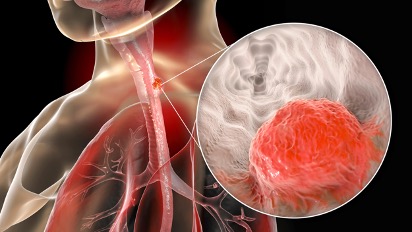Novel Test Identifies Patients at High Risk of Esophageal Cancers
August 20, 2024
Source: drugdu
 297
297
 Barrett’s esophagus is a precancerous condition where chronic acid reflux damages the esophageal lining, increasing the risk of progressing to esophageal cancer or high-grade dysplasia. Currently, about 90% of patients with Barrett's esophagus undergo endoscopic surveillance every three to five years. However, this frequency may not be sufficient to catch some cancerous changes early. It's estimated that up to 25% of patients progress to high-grade dysplasia or esophageal cancer before their next scheduled endoscopy, missing crucial early treatment opportunities. Common treatments include radiofrequency ablation or endoscopic resection to eliminate abnormal cells before they turn cancerous. Now, a novel test could significantly aid gastroenterologists in identifying which patients with Barrett’s esophagus are more likely to develop esophageal cancer, thus optimizing surveillance and management strategies.
Barrett’s esophagus is a precancerous condition where chronic acid reflux damages the esophageal lining, increasing the risk of progressing to esophageal cancer or high-grade dysplasia. Currently, about 90% of patients with Barrett's esophagus undergo endoscopic surveillance every three to five years. However, this frequency may not be sufficient to catch some cancerous changes early. It's estimated that up to 25% of patients progress to high-grade dysplasia or esophageal cancer before their next scheduled endoscopy, missing crucial early treatment opportunities. Common treatments include radiofrequency ablation or endoscopic resection to eliminate abnormal cells before they turn cancerous. Now, a novel test could significantly aid gastroenterologists in identifying which patients with Barrett’s esophagus are more likely to develop esophageal cancer, thus optimizing surveillance and management strategies.
This innovative test, named Esopredict, is a PCR-based test that evaluates DNA methylation changes in the genes RUNX3, p16, HPP1, and FBN1 from biopsy samples. DNA methylation alterations are often early indicators of abnormal cell growth, detectable before clinical symptoms appear. By combining these genomic results with the patient’s age, doctors can better predict the likelihood of a patient’s condition progressing and adjust monitoring frequency accordingly. Researchers at the Johns Hopkins Kimmel Cancer Center (Baltimore, MD, USA) applied Esopredict to historical biopsy samples from 240 Barrett's esophagus patients across six medical centers. They found that the overall risk of developing neoplastic changes was 5.1%. High-risk patients showed a 21.7% chance of progressing to high-grade dysplasia or cancer, significantly higher than 6.87% in the high moderate risk group, 3.25% in the low moderate group, and only 1.27% in the lowest risk group.
These findings published in The American Journal of Gastroenterology suggest that doctors could schedule high-risk patients for more frequent follow-ups, while those with very low scores could have their appointments spaced out further, potentially extending to six or even ten years. Such adjustments could reduce healthcare costs, minimize risks associated with repeated endoscopies, decrease work absences, and lower patient stress. Further research is ongoing, comparing biopsies from the same patients over time and from different esophageal locations to assess how risk scores might vary based on location or change over time. Esopredict is now available commercially, offering a new tool for managing Barrett's esophagus.
“We hope that this test helps clinicians guide surveillance and endoscopic management, so that they can tailor it to the personalized risk of each patient,” said senior study author Stephen Meltzer, M.D., professor of medicine and oncology at the Johns Hopkins University School of Medicine.
Source:
https://www.labmedica.com/molecular-diagnostics/articles/294802189/novel-test-identifies-patients-at-high-risk-of-esophageal-cancers.html
Read more on
- Gan & Lee Pharmaceuticals’ new PROTAC drug GLR2037 tablets have been approved for clinical trials to enter the field of prostate cancer treatment March 3, 2026
- AideaPharmaceuticals plans to raise no more than 1.277 billion yuan through a private placement to focus on the global clinical development of innovative HIV drugs March 3, 2026
- Giant Exits! Its Star Business Acquired March 3, 2026
- Focusing on cardiovascular and cerebrovascular diseases! OpenMediLead Medical Intelligence Dual Engines Launch Internal Testing, Connecting Drug Development and Clinical Diagnosis in a Closed Loop March 3, 2026
- Innovent Biologics Announces Approval of New Indication for BTK Inhibitor “Pitubrutinib” in China March 3, 2026
your submission has already been received.
OK
Subscribe
Please enter a valid Email address!
Submit
The most relevant industry news & insight will be sent to you every two weeks.



